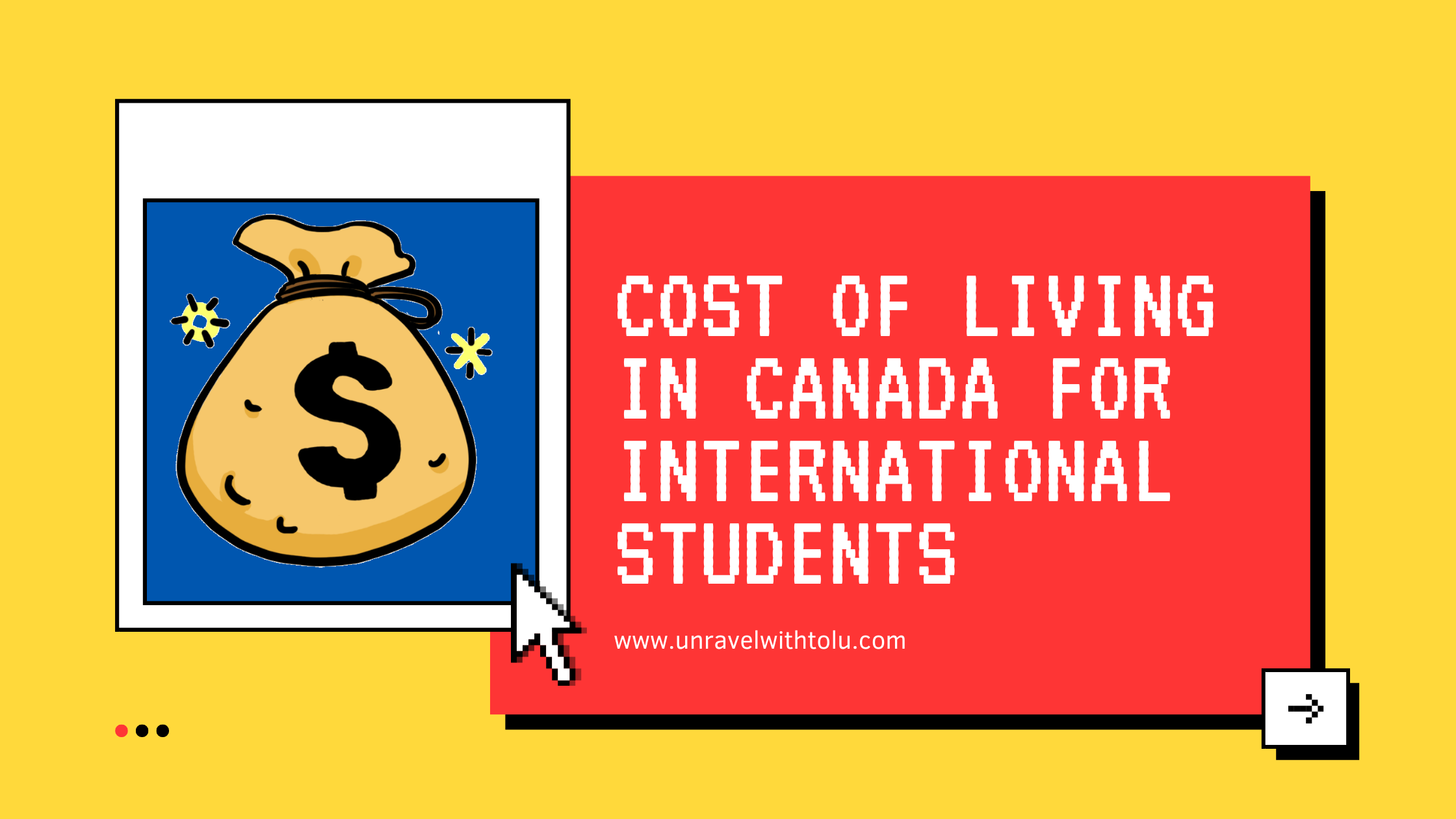
When considering moving abroad for studies, the most important consideration is cost. Everyone wants to know how much money to have in your local currency and how far it will get you in Canadian dollars. Asides from tuition, the cost of living in Canada for international students is an important aspect to analyze before finalizing your study abroad plans.
The Canadian government requires international students to show proof of C$10,000 in living expenses. For any additional dependant, you need to show C$4,000. One of the most-talked aspects of living expenses in Canada is whether $10,000 is enough to support yourself while studying in Canada. I debated on my Instagram whether C$10,000 is too much or too little to cover the cost of living expenses for an international student. I personally do not think it is sufficient.
In 2019, as an international student, I spent about C$20,000 cad on living expenses. Living expenses cover these key following areas:
- Rent
- Grocery
- Eating out
- Books
- Transport
- Utilities – covers phone bill, hydro, heating
- Shopping
- Personal care
- Medical care
****The costs specified in this post are subject to change due to inflation
Keep in mind that Canada is an after-tax (HST, GST, PST) system, in which the price of goods and services is not the final price. This impacts the overall cost of living in Canada as the tax varies from province to province.
Rent
This is typically the largest component of living expenses, accounting for 35% to 50% of your overall spending. Rent in major cities is typically higher than rent in suburban areas. Large cities, such as Vancouver, Toronto are usually the most expensive.
International students can choose to live on or off-campus. For most universities, the rent only covers a 6-7 month period of living on campus and an additional fee is paid for holiday & summer accommodation. For example, living on campus at the University of Toronto costs approximately C$11,000 per year. Meals, hydro, and heating bills are all taken care of when you stay on campus except stated otherwise.
Off-campus housing is typically less expensive; however, you must account for groceries and utility bills in your budget. In Toronto, the average cost of a one-bedroom apartment is C$1,300. With that in mind, the cost of renting per year is C$15,600. You can always find cheaper alternatives such as living in the basement. Check out Kijiji to see how much an apartment will cost in the city or province where you plan to live.
Grocery
According to Goodtimes, the average monthly cost for groceries in Canada is at least $294/person. Personally, I believe this number could be a lot higher depending on your diet. Based on my personal experience, I have spent more money on groceries some months and less money on others. If the figure is close to correct, it means that the cost of food per year is C$3,528.
Buying in bulk is a good way to save money on groceries. In addition, going to the farmer’s market is a good alternative to going to all of the big grocery stores. No Frills is one of Canada’s most affordable grocery store chains.
Eating Out
If you don’t budget for eating out in your living expenses, the cost can start to add up. As a student, there will be days when you will be unable to make time to cook because you are attempting to complete an assignment, working on a group project, or preparing for a big test the following day. It is critical to include this in your living expenses.
On average, eating out costs around C$15. This cost rises in proportion to the number of times you eat out per month. Breakfast is significantly less expensive than lunch and dinner.
Popular Eat out Place In Canada:
- KFC
- McDonald’s
- Domino’s
- Starbucks
- Wendy’s
- Subway
- Tim Hortons
Phone Bill
Canadians pay about C$101 per month on average for their phone bill. This can be much less expensive with networks like Kodoo, which can cost C$45 per month without tax if you already own a cell phone. You must shop around to find the best phone plan deal as they often have new deals. For a year expense, you are looking at C$540 to C$1212.
Healthcare
Most universities will require international students to pay for health and dental insurance. This means that your insurance will cover a certain percentage of your healthcare costs, and you will have to pay the remainder out of your own pocket.
The Canadian healthcare system is a no-fee system, but it must be maintained. This means that you do not have to pay for doctor visits, hospital care, or diagnostic tests, but other items such as drugs, dental care, surgery, and other medical services can cost up to C$7,068/year.
I doubt any international student will pay that much for health care. I only spent about C$200 on healthcare because I don’t have any underlying health conditions that necessitate constant medical attention.
Transportation
Owning a car or taking public transportation are the two options for transportation in Canada. Owning a car entails financial responsibilities such as insurance and maintenance. A monthly bus pass is required for public transportation. Some institutions, however, may include a bus pass in the tuition. The cost of a bus pass differs from province to province. A budget of C$150/month will suffice.
Hydro & Heating
It is recommended that if you live off-campus, you get a place with heating included. However, if heat is not included in the bill, you must pay for both heating and hydro (electricity). The cost of this is not fixed because it is determined by a variety of factors. Heating and electricity bills are delivered every two months.
Personal care
Looking after yourself is very important whether it is getting a haircut or you need to purchase a new set of clothes for the new season. The budget for this is limitless. Some personal care options include:
- Haircare & grooming
- Clothes
- Entertainment
- Massage
- Waxing
- Laundry
- Gym
Books
The cost of the books will be given by your school. Make sure to look online to see if there is a free copy of your textbook available. As an international student enrolled in a master’s program, I barely spent up to C$200 on textbooks.
Others
As part of your budget, include non-recurring expenses such as travel expenses, gift etc. If you are looking after a family member in your home country such as Nigeria or Ghana, you can always send money to them for free using Lemonade Finance.
Conclusion
Spending all this money on living expenses in Canada is worth it if you intend to reside in Canada for the long term. Working part-time while in school (20/week) and full time during the holiday (unlimited hours) is the perfect way to generate an income to sustain your living expenses.
post a comment
You must be logged in to post a comment.

